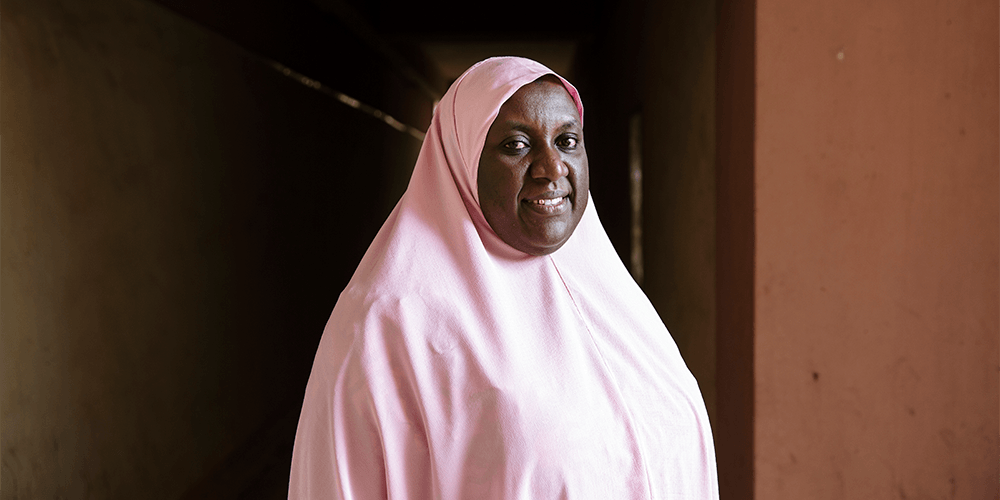
Courtesy of Tolu Onibokun for Malala Fund
Habiba Mohammed is a leader at the Centre for Girls’ Education (CGE) in Nigeria.
Before joining the Centre for Girls’ Education (CGE) nine years ago, Habiba was a teacher for 16 years. With her Malala Fund grant, CGE is launching an advocacy and media campaign compelling the Kaduna State government to improve the quality of literacy instruction in government primary schools and eliminate Senior Secondary School fees. CGE will also enhance its bridge programme for out-of-school girls in preparation for the programme’s expansion, and develop an e-learning package for its community-based clubs that serve rural adolescent girls.
Listen to our interview with Habiba to learn more about her background and work.
TRANSCRIPT
MALALA FUND: Nigeria has the largest number of out-of-school girls of any country in the world. There are many barriers limiting girls’ access to education in Nigeria, including early marriage, poverty and violence. Nowhere are these threats more prevalent than in the northern region.
And it’s here that the Centre for Girls’ Education — or CGE — is working to give girls the opportunity to learn academic and life skills, complete secondary school and realise their full potential.
At the helm of CGE is Habiba Mohammed.
HABIBA MOHAMMED: My name is Habiba Mohammad. I am the leader for Centre for Girls Education here in Zaria. My major role is to ensure that all the projects that we have that has to do with girls’ education.
MALALA FUND: Habiba is one of ten champions selected to be part of Malala Fund’s latest initiative, the “Education Champion Network,” which supports the work of education activists in developing countries. Malala Fund believes that these local leaders are best suited to break down barriers in their communities that prevent girls from going to school.
As co-director of CGE, Habiba plans to develop an e-learning program for safe space clubs and the over 20,000 girls who participate in them. This e-learning program will teach girls life skills and help them to graduate from secondary school.
Crystal Ikanih-Musa represents Malala Fund in Nigeria. She’s based in the capital Abuja.
CRYSTAL IKANIH-MUSA: CGE is doing phenomenal grassroots work. They work directly with girls, typically in the northern part of Nigeria. Through the Malala Fund grant, they’ve been able to reach so many more girls and help them get into school or start school.
MALALA FUND: Despite important education gains in recent decades, Nigeria is still behind in progress for girls’ education and gender equality. The average girl stays in school only through age nine. Less than one-third of girls in Nigeria enroll in the lower secondary school, and, in northern Nigeria, on average less than one in 10 girls completes secondary education.
Safety concerns are a major barriers preventing girls from attending school in northern Nigeria. CGE provides safe space clubs for girls to learn and prepare for their futures.
HABIBA MOHAMMED: In the safe spaces girls are mentored on so many things like life skills, what they need for like negotiations, and the being able to understand self esteem and for them to improve in their literacy because we have issues with quality of education in most of the public schools.
MALALA FUND: CGE’s safe spaces operate within communities. Habiba knows that winning the support of the community is an essential part of protecting girls and creating opportunities for them.
This community-led approach has helped CGE foster solidarity amongst girls in their villages in northern Nigeria. And it’s their success — and Habiba’s leadership — that made Malala Fund want to continue supporting CGE and Habiba through an Education Champion Network grant.
CRYSTAL: We weren’t just looking for organisations just to work with, we were looking for a champion as well, that can lead the advocacy and work with Malala Fund, so they had that as well. And Habiba actually embodied everything that we wanted in a champion, especially for the Nigeria chapter.
MALALA FUND: Malala Fund is excited to see CGE and Habiba further advance girls’ education in Nigeria. In addition to increasing the number of safe spaces to 250 and strengthening the quality of girls’ education through an e-learning program, CGE is establishing a girl-led advocacy campaign to abolish secondary education fees in Nigeria. They are also planning to expand their bridge program, which helps out-of-school girls re-enter school. With an ever-expanding number of girls its programmes reach, CGE is helping to change the future of girls and girls’ education in Nigeria.
CRYSTAL: As for CGE, I really feel that their success always lies in the girls that are impacted, the girls that actually start telling their parents, telling their teachers that they want to go to school, or finding ways to advocate on their own behalf.
To learn more about Education Champion Network as well as other champions supported by Malala Fund, go to malala.org/champions.
